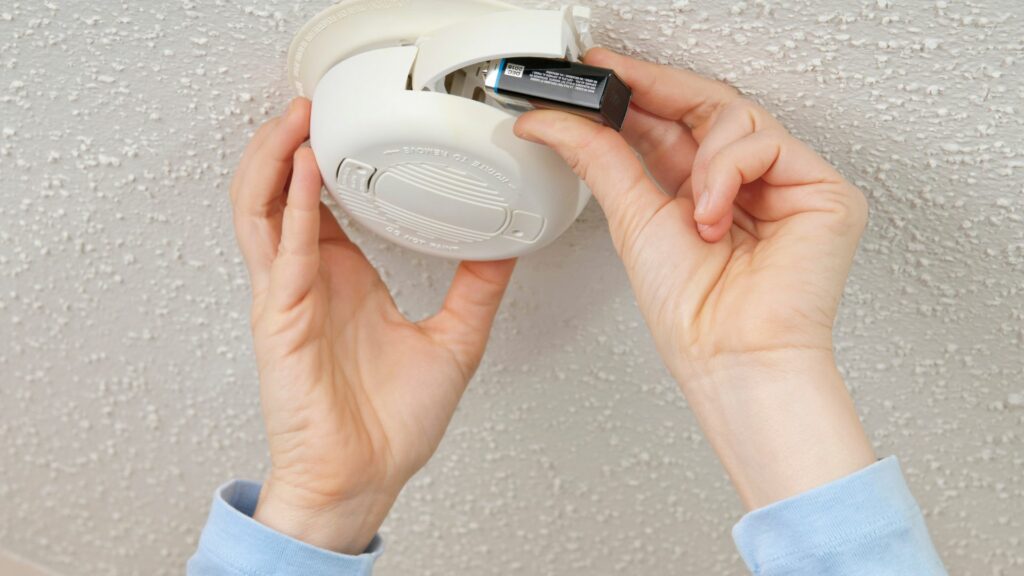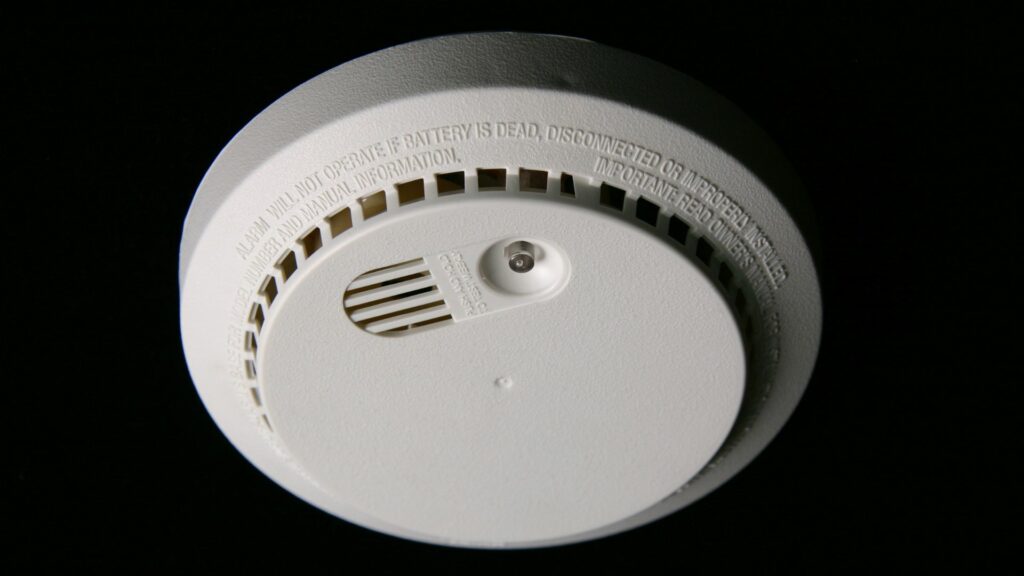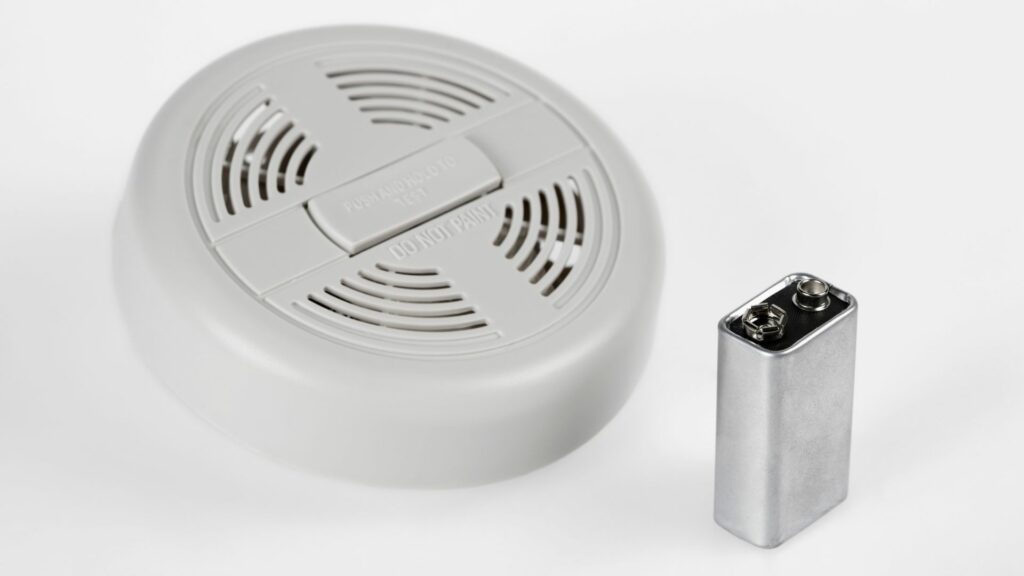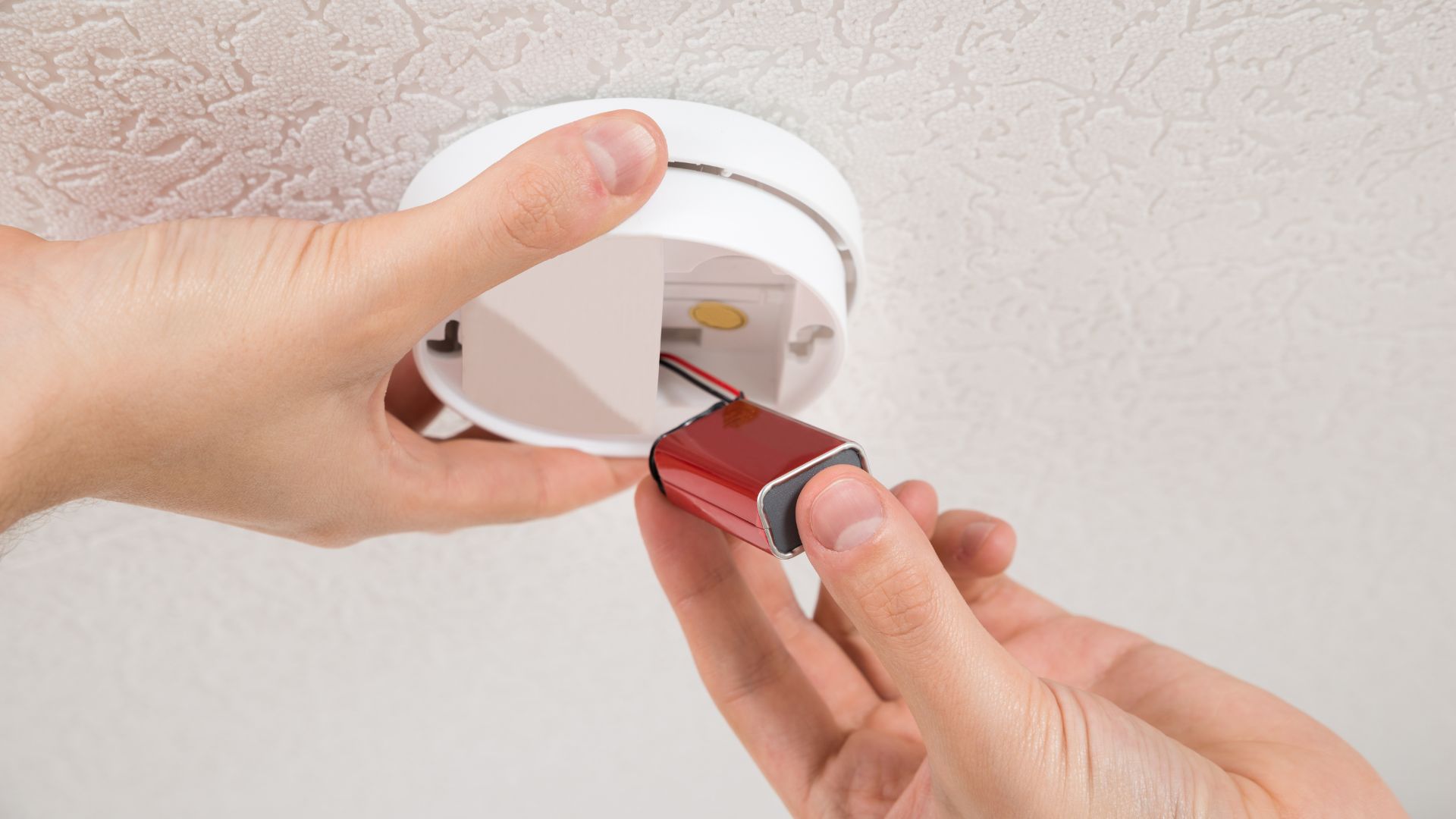The type of battery used and the design of the smoke detector will shape your experiences and observations:
1). Type of Battery Used

Battery-powered smoke alarms are inconvenient because you may forget to change the batteries. Common sense will tell you to utilize rechargeable batteries. But rechargeable batteries are equally unreliable.
Therefore, most people use conventional non-rechargeable batteries in their smoke detectors. 9V batteries are the most common of the bunch. First Alert expects you to replace them every six months.
What about AA batteries? They can also work in smoke detectors. Steve Pietkiewicz published an article in Linear Technology showing that AA batteries are superior to their 9V counterparts. First of all, they deliver 6HW of energy as opposed to the 4WH you find in 9V batteries.
Secondly, AA batteries are cheaper. But how do you add AA batteries to a model that prefers 9V batteries? Gurgle apps encourage consumers to use AA battery holders. They have the same shape as a 9V battery.
Nonetheless, you’re still looking at six months to a year before you replace the batteries. Although, Bebat thinks you can go two or three years without replacing AA batteries in a smoke detector. What if the batteries still have sufficient charge?
That is unlikely to be the case. According to Forbes, smoke detectors are always active. They use their batteries all day long. They can’t afford to go dormant because doing so prevents them from detecting fires. Therefore, you can’t expect their batteries to last longer than a year.
But even if they do, you can’t wait for a smoke detector’s batteries to run dry before replacing them. Stick to the timeline experts have recommended. Otherwise, you will die because your battery-powered smoke detectors stopped working during a fire. Or they worked but couldn’t generate an alert loud enough to warn you because of the low charge in the batteries.
2). Type of Smoke Detector

Smoke detectors come in different types. Some of them can detect flaming fires. Others can sense smoldering fires. You want a device that notices smoldering fires because this allows you to take action before the fire gets too hot.
However, where the power source is concerned, you have two primary options: one that requires new batteries every six months and another you can run for ten years without changing the batteries:
- 9V – Smoke detectors that use 9V batteries require replacements every six months. Again, you should replace the batteries regardless of whether they still have a charge or not.
- Lithium-ion – Lithium-ion smoke alarms are unique. You can replace the batteries every ten years. While that is appealing, it ignores one glaring problem. You can’t stop replacing the batteries. The entire smoke detector must go. Most manufacturers place the batteries beyond the consumer’s reach. Therefore, the device and batteries go hand in hand.
The Washington Post has noticed that many building codes mandate the use of lithium-ion batteries for smoke detectors. 9V batteries are tricky because you must remember to replace them every six months. What if you forget? What if the 9V batteries die earlier than you expected because you bought a defective batch?
Do you want the smoke detector to wake you in the middle of the night, chirping loudly because the batteries are almost depleted? The 10-year smoke detector is the better option.
This raises another concern. You don’t always have a choice in the matter. If the local authorities demand the use of a particular battery or smoke detector type, you must obey.
It is worth noting that hardwired smoke alarms have batteries as well. Yes, they get their power from your home’s circuit. But what happens when a blackout occurs? The batteries provide backup power during this period. This allows the hardwired smoke detector to protect you despite the blackout.
Hardwired smoke detectors need new batteries every six months. Other notable variables and concerns include:
- Age – Age doesn’t matter quite as much as people think. Older smoke detectors will deplete their batteries at roughly the same rate as their younger counterparts.
- Power Supply – If you have a hardwired smoke detector, it may deplete the backup batteries faster than expected because the power supply keeps disconnecting.
- Installation – Who installed the smoke detector? Installation errors can create malfunctions that deplete the battery at a faster rate.
- Defect – Some smoke detectors have factory defects. Others develop faults because of surges, spikes, brownouts, poor handling, and more.
Signs That Your Smoke Detector Battery Needs To Be Replaced
You shouldn’t wait for a sign to replace the batteries. The Cheshire Fire and Rescue Service in the UK agrees with experts in most developed nations that encourage consumers to replace smoke detectors with lithium-ion batteries every ten years.
You shouldn’t wait for the batteries to die. But what if the batteries go flat earlier than expected? Haresh D. Rochani, Steve Davidson, and Valamar Malika Reagon performed a study (Georgia Southern University) that explored the rate at which lithium-powered smoke alarms fail. Their results revealed that some lithium-battery-powered detectors last five years or less.
Therefore, you should know what to look for when a smoke detector stops working because of a depleted battery. Fortunately, smoke alarms chirp noticeably when the battery charge is low. Look for intermittent or continuous chirping. Don’t confuse this noise with the alarm’s usual sounds.
For instance, the alarm beeps continuously when it detects smoke. The chirping is more akin to single beeps you hear every thirty seconds to a minute. Although, smoke detectors can chirp for other reasons, including the following:
- You installed the detector correctly but forgot to remove the battery pull tab. This can cause a hardwired smoke alarm to chirp incessantly.
- You forgot to close the battery drawer. As a result, the batteries cannot maintain firm contact with the terminals.
- The batteries are defective.
- One or more terminals are covered with debris. This prevents the batteries from making proper contact with the terminals.
- Your home has wild temperature fluctuations.
Some smoke detectors have indicator lights that illuminate or flash when the battery charge is low. Check the manual to get a better understanding of the alarm’s attributes. Don’t forget that smoke detectors have limited lifespans.
Some of them chirp simply because they’ve reached the end of their life. In other words, new batteries are not enough. You must replace the smoke detector. Common symptoms of a smoke alarm you should replace include:
- The device will turn yellow because of the bromine. Bromine is a flame retardant that allows the detector to tolerate fires. Over time, it will turn the smoke detector yellow because of exposure to heat, oxygen, and light. Replace a yellow smoke detector.
- A device that chirps even when you change the batteries should concern you. If you’ve ruled out other culprits, including debris and defective batteries, the smoke detector has reached the end of its life.
- You must test the smoke detector once a month by pressing the ‘Test’ button. A dying smoke detector will fail this test.
- The smoke detector will become annoyingly sensitive, beeping for no apparent reason.
Smoke detectors have a label showing the date they were made. Use that date to track the device’s life and replace it before it crosses the ten-year mark. Otherwise, it may stop working when you need it most.
Tips For Extending The Life of Your Smoke Detector Battery

1). Install new batteries every six months. This reduces the chances of the batteries failing unexpectedly during an emergency.
2). Perform monthly tests. A test will reveal malfunctions. This allows you to diagnose and fix them. A defective smoke alarm can deplete the batteries at a faster rate.
3). Keep the smoke detector clean. You don’t have to disassemble it. Use a vacuum. This will prevent dust and debris from invading the alarm’s internal components and interfering with the device’s operations.
4). Don’t replace old batteries in the smoke detector with old batteries from a different device. Use a new set. Additionally, you shouldn’t borrow batteries from the alarm. You will forget to put them back.
5). Make sure the hardwired alarms have a reliable power supply. Tighten loose connections and replace frayed wiring.
6). Replace smoke detectors every ten years. Otherwise, they will become less reliable, especially if you’ve had yours for more than ten years. An old smoke detector is either too sensitive or not sensitive enough.

